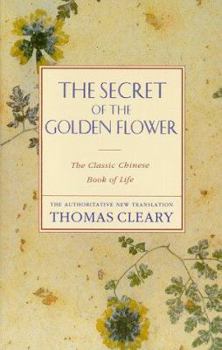The Secret of the Golden Flower
Select Format
Select Condition 
Book Overview
The ancient Taoist text that forms the central part of this book was discovered by Wilhelm, who recognized it as essentially a practical guide to the integration of personality. Foreword and Appendix... This description may be from another edition of this product.
Format:Paperback
Language:English
ISBN:0062501933
ISBN13:9780062501936
Release Date:March 1993
Publisher:HarperOne
Length:160 Pages
Weight:0.40 lbs.
Dimensions:0.4" x 5.3" x 8.2"
Customer Reviews
3 ratings
The Secret of Life
Published by Thriftbooks.com User , 15 years ago
Some people struggle with this book. The reason? It's not an intellectual read. You have to practice the method to understand it. At the same time, you have to master each technique, one at a time. Only when you master Technique A, can you move on to Technique B. It's like a treasure hunt; you can only get to Point B after you reach Point A. This frustrates some people. But that doesn't deter from the underlying value of the method, or its truth, that it does contain the secret of life I spent two years breaking it down. Sure , I became frustrated. Sure, I doubted, but in the end I understood that this method was part of the Buddha's practice. If He'd learned and mastered these principles and passed them on to us, there must have been a reason: that, with effort, we, too, could master the science of Deciphering the Golden Flower One Secret at a Time.
Penetrating Text and Commentary by Jung
Published by Thriftbooks.com User , 19 years ago
A very interesting and meaningful book to say the least. And like Jung, gratitude must be given Richard Wilhelm for his insight in the East and translation of the text. A manual written symbolically for the practice of meditation, where thoughts are reduced to the square inch between the eyes, the eye lids half closed, eyes centered near the tip of the nose, the heart rate next to nothing in quietude, controlled breath of a circular motion that becomes quiet. The "white light" so spoken in Buddhist terms and various states of consciousness are related. However, this is far more than a mere meditation manual, but symbols which convey non-intellectual ideas, that is, non-Western rationalism, and yet significant and advanced in both it's teaching and applications. Ultimately for myself, it is Jung's commentary that my Western mind needed to interpret the text itself and the subsequent interpretations. I am moved in profundity on Jung's analysis that man's consciousness advances non-rationally, but psychically. Where the advancement cannot be spoken or written of in intellectual terms but rather can be done so in symbols. In this, Jung expounds on the idea that symbols convey advanced images that relate to the psyche and can never be proved intellectually or rationally. This is where images, as in Mandalas, come in. Images and symbols speak what words cannot. They are of a higher conscious level awareness, a psychical advancement. None of this is rationally or mathematically equated, none, nor can it be languistically conveyed. Humans can only point, using symbols and images, they can not expound, explain and reason on such. Jung's acknowledges the law of opposites and how the Chinese contain a higher culture or mind than the West, one that can contain contradictions or opposites without one-sided fundamentalism. And this is no doubt far ahead of most Western thinking in terms of black and white thinking, or what Jung calls barbarism. This reminds me of Walt Whitman's self poem of containing all contradictions and Keats "negative capabilities" and Shakespeare's comments on having all thoughts together without becoming irritable over such, and that including the beat poet, Allen Ginsberg, who spoke of the same. In Jung's memorial words dedicated to Richard Wilhelm, he relates to his thoughts on Synchronistic principle, which confirm his validity on the practices of Chinese wisdom found in I-Ching and Astrology, both sciences based not on Newtonian, or causality principles but rather through a remarkable phenomena of the unconscious, psychic parallelisms based which cannot be related to each other causally. The Tao will never be created with words and concepts, a teaching that is absent from the history of philosophy since the time of the pre-socratic, Heraclitus, and only reappears as a faint echo in Lebinitz.
Not a page is wasted
Published by Thriftbooks.com User , 23 years ago
This book is absolutely worth reading, from cover to cover, including all of the commentaries and introductions and what have you. The text itself is, of course, incredible, with a surprising clarity that is rare among aged religious and philosophical texts, especially those pertaining to meditative practice, and Richard Wilhelm's somewhat outdated translation doesn't inhibit it much. Carl Jung's commentary is equally worth reading, and could easily stand as a book of its own. It also thankfully puts this book at arm's length from watery New Age "spirituality." Get this book and don't skip anything.





